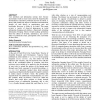Free Online Productivity Tools
i2Speak
i2Symbol
i2OCR
iTex2Img
iWeb2Print
iWeb2Shot
i2Type
iPdf2Split
iPdf2Merge
i2Bopomofo
i2Arabic
i2Style
i2Image
i2PDF
iLatex2Rtf
Sci2ools
119
Voted
CHI
2009
ACM
2009
ACM
An elementary social information foraging model
User interfaces and information systems have become increasingly social in recent years, aimed at supporting the decentralized, cooperative production and use of content. A theory that predicts the impact of interface and interaction designs on such factors as participation rates and knowledge discovery is likely to be useful. This paper reviews a variety of observed phenomena in social information foraging and sketches a framework extending Information Foraging Theory towards making predictions about the effects of diversity, interference, and cost-ofeffort on performance time, participation rates, and utility of discoveries. Author Keywords Social information foraging theory. ACM Classification Keywords H5.m. Information interfaces and presentation (e.g., HCI): Miscellaneous.
CHI 2009 | Human Computer Interaction | Information Foraging Theory | Keywords Social Information | Social Information Foraging |
Related Content
| Added | 24 Nov 2009 |
| Updated | 24 Nov 2009 |
| Type | Conference |
| Year | 2009 |
| Where | CHI |
| Authors | Peter Pirolli |
Comments (0)

